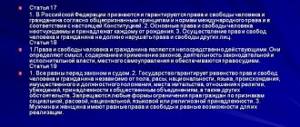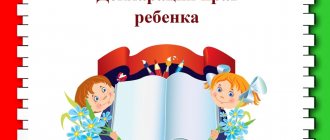In the minds of the average citizen, as a rule, material objects are inherited, such as real estate, money and personal belongings of the deceased. However, the concept of property is somewhat broader than it might seem at first glance. It applies to any property, including intellectual property. Not everyone knows that the inheritance of objects of intellectual work has its own specific features and hidden pitfalls. What is this object of inheritance, in particular copyright, to whom can these rights be bequeathed, for how long and in what order?
- 3.1 Table: types of copyrights and features of their inheritance
- 4.1 When there are no heirs
- 5.1 Documents for accepting inheritance
Definition of intellectual property and author's rights
Intellectual property is the result of the mental activity of its creator. This type of property, like any other, is inviolable for outsiders, since only the author has the right to prohibit or allow the use of the objects of his mental work.
The results of intellectual activity are the property of the author, inviolable for other persons
Intellectual property includes such objects as, for example:
- works of art and scientific works;
- inventions in all spheres of human activity;
- performing activities of artists, their audio and video recordings, phonograms and radio broadcasts;
- industrial designs;
- trademarks, service marks, trade names and designations.
Their creators have exclusive, property and personal non-property rights to the objects listed above:
- rights associated with any human inventions;
- rights of patent holders;
- copyright;
- rights related to copyright.
The creation of literary works, objects of art, scientific works, being one of the examples of mental work, gives the creator the right to dispose of the results of his intellectual work at his own discretion.
Video: basic concepts in the field of intellectual property
Intellectual property as part of the inheritance estate
Everything related to the issue of inheritance is discussed in detail in the Civil Code of the Russian Federation. In addition, there is Resolution of the Plenum of the Supreme Court of the Russian Federation dated May 29, 2012 No. 9 “On judicial practice in inheritance cases,” where you can also obtain the necessary information about the process of accepting an inheritance. According to the conclusions of the legislators, the inheritance mass, along with other objects, includes intellectual property.
The inheritance includes things and other property that belonged to the testator on the day the inheritance was opened, including property rights and obligations. The inheritance does not include rights and obligations that are inextricably linked with the personality of the testator, in particular the right to alimony, the right to compensation for harm caused to the life or health of a citizen, as well as rights and obligations, the transfer of which by inheritance is not permitted by this Code or other laws . Personal non-property rights and other intangible benefits are not included in the inheritance.
Art. 1112 Civil Code of the Russian Federation
Personal non-property rights
This includes purely personal rights that are not subject to inheritance, cannot be alienated or transferred. These rights include:
- The right of authorship means that only the author can be considered the creator of the work.
- Right to use the name. The author may prohibit the publication of a work under his own name or use a pseudonym for publication.
- The right to preserve the integrity, authenticity of the work, inviolability with respect to its name and content. The author can correct, add, shorten or supplement his work.
- Right of publication or revocation.
Personal non-property rights are not inherited. The name and integrity are subject to perpetual protection by successors and other interested parties. The owner of intellectual work can indicate in the will the person responsible for the preservation of personal non-property rights.
Features of inheritance of intellectual property
It’s worth mentioning right away that only the rights to a work created by someone (be it a work of fiction or scientific work, music, fine art) are bequeathed, but not the work itself. Heirs have the opportunity to claim certain property rights. For example, they can make a profit from the use of the work, since the author himself had the right to do so. When we talk about intellectual heritage, we mean the acceptance of ordinary property rights. Personal non-property rights are inalienable from the author; they cannot be transferred to third parties.
For example, when a novel is published, the name of its author is indicated on the cover, regardless of whether he is alive or dead. This is a personal non-property right. During his lifetime, the writer receives the fee himself, and after his death - his heirs. This already applies to the area of property law.
It is not the results of the author’s intellectual work themselves that are subject to inheritance, but only the rights to this work
By a will, the testator has the right to oblige the heirs to dispose of intellectual property in a certain way.
For example, a composer bequeaths to his son the right to publicly perform and distribute a song to a musical group for a specified period. This type of will is called a bequest. The performing group will act here as a legatee.
Copyright is divided, in turn, into several types. And they have different conditions of inheritance.
Table: types of copyrights and features of their inheritance
| Type of copyright | Characteristic | Nature of inheritance |
| Exclusive property rights | Rights of the author or copyright holder:
| Bequeathed or inherited by law. If there are no heirs, the intellectual property becomes public domain. |
| Right of succession | The right to receive interest on the sale or resale of the original work | You cannot bequeath at your own discretion; it must pass only to the author’s heirs by law for as long as the copyright is in effect. |
| Personal non-property rights | Right of authorship, author's right to name, integrity of work, protection of author's reputation | They are not inherited and are retained by the author indefinitely. Heirs have the right to protect these rights. |
| Right of publication, withdrawal of work and modification | Refers to non-property rights | The law does not clearly define the possible actions of heirs regarding the work, and there is no controlling body. However, the right to the integrity of a work is recognized a priori. The will of the testator, expressed in a will, letters, contracts or other written form, is decisive. |
Video: Copyright Inheritance
Problematic aspects in the patent inheritance procedure
Controversial and problematic issues lie in the complex procedure for inheriting a document. Thus, having inherited a certificate or application for the use of an invention, recipients often want to make adjustments to it. The condition for carrying out such an action is payment of the tariff for the provision of services by the Federal body. After payment has been made at a certain rate and the patent certificate (original) has been provided, the government agency makes the required changes to the paper and issues it in a new form. At the same time, a bulletin with adjustments is published in the State Register.
Sample
Often the procedure for making changes encounters controversial issues that can only be resolved in court. Their categories include:
- disputes between heirs regarding permission to own;
- disputes about the share of remuneration that will go to the heirs;
- disputes regarding the assignment of copyright by a testator.
Often, conflicts arise against the background of a patent rule that allows the author of an invention to mention the successor of the patent in his will or indicate his name when filing an application. Patenting rules also allow recipients to transfer their rights to third parties, which also sometimes leads to litigation.
Heirs of intellectual property
The legal framework of our country provides for two ways of inheriting intellectual property: by will and by law. The testator can formalize his will in writing, where he will dispose of the property according to his preferences. He has the right to bequeath his property to relatives or citizens not related to him, as well as to various organizations (museums, foundations, etc.).
Despite the fact that the testator can indicate who and in what order will receive exclusive rights in the future, the legal requirement to allocate a mandatory share in the inheritance for his disabled close relatives and dependents must be observed.
Intellectual property can be inherited by one or more persons. If the testator in his will did not show a desire to divide the rights, then they are inherited as a single whole. The presence of several heirs is not an obstacle to fulfilling such a requirement. They all equally claim copyright, which is indivisible. It is unacceptable to divide copyrights, that is, it is prohibited to bequeath them in parts to different people if it concerns the same object of intellectual work. Exclusive rights to creative heritage are bequeathed only in aggregate.
When a work is created in collaboration, the rights to use it and receive remuneration are partially transferred to heirs and/or other co-authors (by law or by will). As a rule, all copyright holders enter into an agreement among themselves on the principles of use of the work. The law does not regulate this area clearly enough. Rights to parts of a work that have independent value and significance are inherited in full.
It happens that the author did not have time or did not express the desire to leave behind a will with precise instructions regarding his property. In this case, the inheritance is accepted by law. This means that the heirs of intellectual property will be close relatives (in order of priority), but not outsiders and organizations. If there are no relatives making up the first line (children, spouses, parents of the deceased), heirs of subsequent lines are allowed to inherit.
If the testator did not leave a will, all property passes to his relatives in order of priority.
Property acquired during marriage is usually considered marital property. After the death of one of the spouses, the second has the legal right to half of it. But this rule does not apply to intellectual property: only the one who is considered the author has the right to use the work, unless otherwise specified in the marriage contract. The only exception will be royalties. Thus, the copyright passes to the estate in full, and not in part.
When there are no heirs
It happens that a work becomes public knowledge. This occurs due to the fact that the author’s exclusive rights are terminated, and from then on his property is considered escheat. This is possible in the following cases:
- There are no heirs.
- None of the heirs has the right to inherit.
- All heirs are excluded from inheritance.
- The heirs did not express a desire to accept the inheritance and did not confirm their refusal in favor of another heir.
If it so happens that the work becomes public knowledge, then royalties are no longer paid. From now on, anyone can freely use the work without asking permission. At the same time, it remains inviolable (you cannot correct it and assign your own name to it).
If several heirs receive rights
Inheritance may involve similar circumstances. It is immediately necessary to make a reservation that it is not the copyright intellectual right that will have to be divided, but the royalties for the use of the products of the testator’s mental labor. When inheritance occurs by will, most likely the will of the deceased includes orders to assign shares to each of the successors. Otherwise, they will receive equal shares from each transaction. In other words, after the completion of the inheritance and re-registration procedure, the successors will receive money paid by individuals or legal entities interested in using intellectual rights.
Inheritance by law will allow priority claimants of intellectual property to receive equal shares. The procedure can be changed with the general consent of the legal successors, reflected in the corresponding application. Another way is to issue a waiver during the inheritance process, appointing a new successor. If this is a contender for an intellectual object of inheritance from the same queue, its share will double. An unaddressed refusal will lead to the distribution of material intellectual rights in proportion to the shares due.
Inheritance involves the transfer of not only intellectual rights, but also the debts of a deceased citizen. This could be an unrepaid loan, unpaid payments under contracts, utility debts, etc. Alimony and payments for damage to health are not transferable. But creditors have the right to demand repayment of the debts of the deceased from persons who won in the inheritance process. And, if it is not possible to make money from the intellectual work of the deceased, the feasibility of inheritance should be assessed.
Terms and order of inheritance
The legislation establishes a period of 6 months during which what is bequeathed or transferred by law must be accepted by the heir(s). To do this, the heir must submit a corresponding application to the notary's office. When the allotted six months expire, he receives a certificate confirming his right to inheritance. It is very important to correctly fill out the application for acceptance of inheritance, as well as submit the necessary documents. Only error-free and timely completion of all actions will make it possible to receive any further deductions from the use of the bequeathed property.
The terms of copyright inheritance are determined by law
Exclusive copyrights are valid for a certain time. This period depends on the specific result of mental work:
- for invention - 20 years;
- for a utility model - 10 years;
- for an industrial design - 15 years;
- for a work - during the life of the author and 70 years after his death. If the author was a participant in the Second World War, the period increases to 74 years.
Documents for accepting inheritance
In order for a notary to certify the rights to inherited property, it is necessary to submit documents that would confirm the existence of these rights by the deceased himself. This could be a patent for an invention or a certificate from any organization certifying the fact that this particular person created an intellectual product. A certificate from the Russian Authors' Society or creative union, if the author was a member of it, is suitable for these purposes. In addition, the application for the right of inheritance can simply indicate the fact that the copyright belonged to the deceased. Evidence of the creation of a work of science or art is not required, since the mere indication of the name of the author will serve as the basis for its recognition as such.
To accept an inheritance, the following documents will be required:
- death certificate of the testator;
- documents of the heir;
- documents on the right to inheritance (will, marriage contract, marriage certificate, confirmation of family ties, court decisions, etc.);
- documents about state registration of the testator's rights to intellectual property;
- receipt for payment of state duty.
In controversial cases, proof of authorship can serve as a certificate of deposit of the work
How are legal disputes regarding the inheritance of copyrights resolved?
If a controversial situation arises around copyright protection, it can be resolved in a court of general jurisdiction, as well as in an intellectual property rights court.
If it is impossible to reach mutual understanding between the heirs, their dispute will need to be resolved in court. Claims are usually heard before a magistrate. But only if the amount of the claim does not exceed 50 thousand rubles. Otherwise, you should contact the district court at the place where the inheritance case was opened.
What happens to copyrights in the absence of heirs?
In the absence of a will, inheritance occurs in order of priority - children, parents and spouses inherit first. But if they are not there, then brothers, sisters, aunts and uncles and other persons who are legally recognized as relatives get the opportunity to inherit.
Situations are possible in which a person does not have any relatives, and he does not plan to bequeath his property. Either there are heirs, but for some reason they are deprived of the opportunity to obtain copyrights, or have abandoned them altogether.
If this situation occurs with intellectual property, then the rights to authorship are terminated without expiration of the 70-year period. And property becomes public.
Thus, it should be remembered that the heirs do not acquire the intellectual property itself, but the rights to it. However, some types of powers are not available to them. Copyrights, which belong exclusively to the authors, are not inherited.









